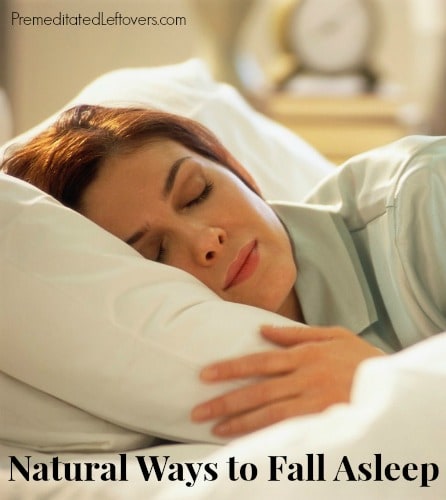You’ve been there. You turn off the lights, pull your covers up tight, and hunker down for a good night’s sleep and then nothing. You stare at the ceiling and hope for sleep to come and it doesn’t. Staring at the clock only makes it worse as you count down the hours of sleep you can get before the alarm goes off. It’s miserable, but there are some things you can do to help yourself fall asleep without relying on prescription or over the counter medications.
Natural Ways to Fall Asleep
First, you want to make sure you bedroom is conducive to sleep. It’s amazing what a difference a few changes can make. It could be as simple as covering the light from your alarm clock or any electronics in your room. Optimum sleeping temperature is between 65 to 70 degrees. Just a few degrees warmer or cooler can lead to tossing and turning because you are too hot or too cold. You also want make sure your room is quite. If you need noise, try a white noise machine or soft calming or classical music.
The scent of lavender is synonymous with inducing sleep naturally. There are several sleep related products on the market that feature lavender. From pillow sprays to body lotions you can find them just about anywhere. For a more natural approach a few drops of Lavender essential oil behind the ears, and on the temples will help relax your body and induce sleep. There are also vaporizers and diffusers that will release the scent throughout the night.
Several foods and drinks can help encourage sleep. Sipping herbal chamomile tea will help get your body ready for sleep. There are tea blends formulated for sleep but most any tea before bed is helpful, except for the ones with caffeine of course. In addition, a warm glass of milk is more than just a home remedy your mother told you about. Milk contains tryptophan, the same kind that you find in turkey, which makes you feel sleepy and relaxed. Bananas are also known to help encourage you to fall asleep.
As part of your bedtime routine, taking a warm bath is more than just a way to relax it also helps your body prepare for sleep. Warm baths will help raise your body temperature. Once you get out of the bath the rapid temperature drop triggers sleep.
When lying in bed and unable to fall asleep, using progressive muscle relaxation is one way to get your mind off of not sleeping and relax your body at the same time. Progressive muscle relaxation is where you focus on muscles in the body and consciously relax them. Usually people start at their toes and work their way up the body ending with the head. Spend some time on each muscle area and really focus on each muscle fiber relaxing. There are several books and articles that can teach you how to use progressive muscle relaxation.
If these techniques fail to help you sleep, there are also some herbal supplements that you can use to help you sleep. Valerian root and dandelion supplements have all been shown to help people fall asleep. In addition, melatonin capsules are often recommended to help with sleep. These won’t make you sleepy but they do help regulate your sleep and wake cycles. Make sure you consult your doctor prior to using any natural supplements. Some are known to interact with routine medications.
These are just a few of many ways to help you fall asleep naturally. Building your bedtime routine around some of these suggestions should help rid you of sleepless nights and help avoid the use of over the counter sleeping medications. If sleepless nights last for more than a couple days however, you should talk to your doctor to rule out any medical conditions that might be contributing to your sleeplessness. Sweet dreams!
More Natural Health Articles:
- Natural Ways to Relieve Headaches
- The Health Benefits of Coconut Oil
- The Health Benefits of Turmeric
- The Health Benefits of Flax Seeds
- The Health Benefits of Chia Seeds
- 20 Frugal Ways to Use Coconut Oil
Alicia can be found on her blog Moms Don’t Say That where she share recipes, tips, and musings from her life.


Leave a Reply